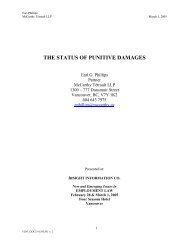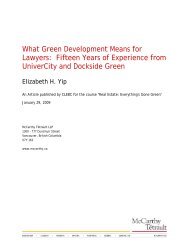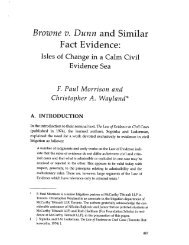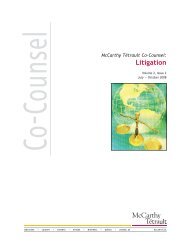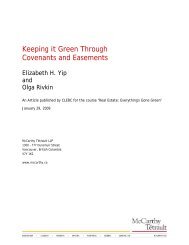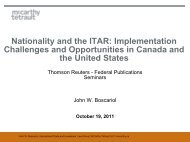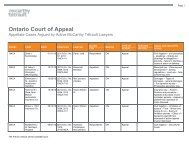The Doctrine of Public Policy in Canadian Contract Law
The Doctrine of Public Policy in Canadian Contract Law
The Doctrine of Public Policy in Canadian Contract Law
Create successful ePaper yourself
Turn your PDF publications into a flip-book with our unique Google optimized e-Paper software.
<strong>The</strong> <strong>Doctr<strong>in</strong>e</strong> <strong>of</strong> <strong>Public</strong> <strong>Policy</strong> <strong>in</strong> <strong>Canadian</strong> <strong>Contract</strong> <strong>Law</strong> 1 31<br />
enantee' s <strong>in</strong>terest,'65 and the latter as <strong>in</strong>volv<strong>in</strong>g an open-textured exam<strong>in</strong>ation<br />
<strong>of</strong> various criteria such as the social and economic effects <strong>of</strong> the covenant upon<br />
the public at large. 166 Blair J.A. also clarified the relationship between the<br />
"public <strong>in</strong>terest" test for reasonableness, and the "public policy" test for prima<br />
facie unenforceability, <strong>in</strong> stat<strong>in</strong>g that "the broad issues <strong>of</strong> public policy which<br />
determ<strong>in</strong>e whether a restra<strong>in</strong>t is prima facie void are not to be confused with<br />
the more detailed considerations <strong>of</strong> the public <strong>in</strong>terest which might justify it."167<br />
In light <strong>of</strong> these comments, it is submitted that the primary reason why a contract<br />
<strong>in</strong> restra<strong>in</strong>t <strong>of</strong> trade violates public policy, as opposed to the "public <strong>in</strong>terest",<br />
is the <strong>in</strong>dividual liberty right which it violates rather than the socio-economic<br />
concerns implicated by the latter concept.<br />
Another head <strong>of</strong> public policy which may be grouped under the restra<strong>in</strong>t<br />
<strong>of</strong> trade category relates to agreements which impose serious restrictions upon<br />
personal liberty.'68 <strong>The</strong> most famous example <strong>of</strong> such a contract is to be found<br />
<strong>in</strong> the case <strong>of</strong> Horwood v. Millar's Timber & Trad<strong>in</strong>g Co. Ltd.,169 <strong>in</strong> which a<br />
debtor covenanted with his creditor that he would, for the duration <strong>of</strong> a loan,<br />
assign to the latter nearly all <strong>of</strong> his current and future wages, and neither sell<br />
nor pledge any <strong>of</strong> his property as security, borrow any money, seek to be granted<br />
any credit, nor move from his current residence, without the lender's express<br />
consent to any <strong>of</strong> the forego<strong>in</strong>g. <strong>The</strong> Court concluded that this contract was<br />
contrary to public policy. A similar sentiment was expressed <strong>in</strong> Archer v. Society<br />
<strong>of</strong> Sacred Heart <strong>of</strong> Jesus ,170 where a contract between a nun and a religious<br />
organization for the ma<strong>in</strong>tenance <strong>of</strong> the former, provided <strong>in</strong> consideration for<br />
the religious vows <strong>of</strong> poverty, chastity and obedience made by her to the latter,<br />
was deemed contrary to public policy.<br />
165 Ibid. at para. 20.<br />
166 Ibid. at paras. 41-46.<br />
167 Ibid. at paras. 33-34.<br />
168 An <strong>in</strong>terest<strong>in</strong>g recent case <strong>in</strong> this area can be found <strong>in</strong> Johnstone v. Bloomsbury Health<br />
Authority, [1991] 2 All E.R. 293 (C.A.), where the Court held that a contract requir<strong>in</strong>g<br />
a junior doctor to work excessively long hours was not contrary to public policy. Certa<strong>in</strong><br />
commentators have suggested that this head <strong>of</strong> public policy should not be unduly<br />
extended, s<strong>in</strong>ce "it is possible to contend that all contracts represent restra<strong>in</strong>ts on future<br />
freedom, because they are promises to act, or not to act, <strong>in</strong> a certa<strong>in</strong> way relative to the<br />
other party. .. [O]n a spectrum <strong>of</strong> enforceability, a dist<strong>in</strong>ction must be made between<br />
contracts that are autonomy-endanger<strong>in</strong>g and those that are merely autonomy-consum<strong>in</strong>g"<br />
(Judd, supra note 19 at 699).<br />
169 [1917] 1 K.B. 305 (Eng. K.B.).<br />
170 (1903), 9 O.L.R. 474 (C.A.). See, however, H<strong>of</strong>er v. H<strong>of</strong>er,[1970] S.C.R. 958, 1970<br />
CarswellMan 51, <strong>in</strong> which the Supreme Court <strong>of</strong> Canada held that the articles <strong>of</strong> association<br />
<strong>of</strong> a religious colony, that provided for the expulsion <strong>of</strong> members who did not<br />
adhere to the tenets <strong>of</strong> the faith, were not contrary to public policy as be<strong>in</strong>g an unlawful<br />
constra<strong>in</strong>t upon the members' freedom <strong>of</strong> religion.




